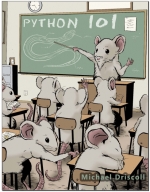Python 101. M. Driscoll

Категория: Python
Поделиться:
I think it helps to know the background of the Python programming language. Python was created in the late 1980s. Everyone agrees that its creator is Guido van Rossum when he wrote it as a successor to the ABC programming language that he was using. Guido named the language after one of his favorite comedy acts: Monty Python. The language wasn’t released until 1991 and it has grown a lot in terms of the number of included modules and packages included. At the time of this writing, there are two major versions of Python: the 2.x series and the 3.x (sometimes known as Python 3000) . The 3.x series is not backwards compatible with 2.x because the idea when creating 3.x was to get rid of some of the idiosyncrasies in the original. The current versions are 2.7.12 and 3.5.2. Most of the features in 3.x have been backported to 2.x; however, 3.x is getting the majority of Python’s current development, so it is the version of the future.Some people think Python is just for writing little scripts to glue together “real” code, like C++ or Haskell. However you will find Python to be useful in almost any situation. Python is used by lots of big name companies such as Google, NASA, LinkedIn, Industrial Light & Magic, and many others. Python is used not only on the backend, but also on the front. In case you’re new to the computer science field, backend programming is the stuff that’s behind the scenes; things like database processing, document generation, etc. Frontend processing is the pretty stuff most users are familiar with, such as web pages or desktop user interfaces. For example, there are some really nice Python GUI toolkits such as wxPython, PySide, and Kivy. There are also several web frameworks like Django, Pyramid, and Flask. You might find it surprising to know that Django is used for Instagram and Pinterest. If you have used these or many other websites, then you have used something that’s powered by Python without even realizing it!
Скачать
Комментарии